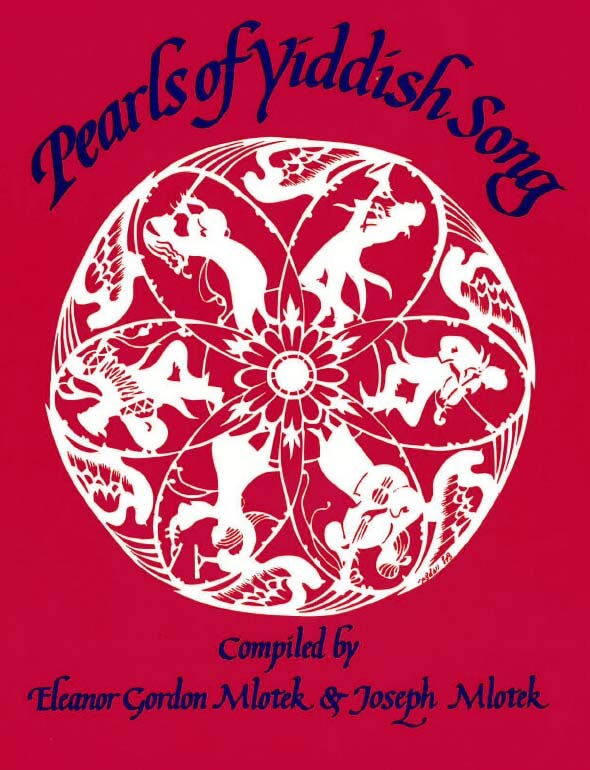Words by Jacob Jacobs (1892-1972); music by Sholom Secunda (1894-1974). Published in sheet music by Metro Music Co., N.Y., 1937.
Used by permission of the copyright owners, Ethnic Music Publishing Co., Inc.

Do you remember those sweet times when we were still children?
How our mother would accompany us when we’d go to kheyder and father would cry:
— My son, study, because now you still have time and because shabes your father will want to hear what you learned all week.
And shabes, our father would say:
— Young man, let’s hear something good.
And when you couldn’t, he’d whip you soundly.
And then they’d say the afternoon prayer with the minyan [quorum] and not alone.
And then there’d be such rejoicing when our father would sing zmires at the shabes meal — that the Holy Temple will be rebuilt!
Gedenkt ir yene zise tsaytn
Ven mir zaynen kinder nokh geven?
Vi di mame flegt undz dan bagleytn
Ven mir flegn in kheyder geyn,
Un der tate flegt shrayen: — yingele, lern,
Vayl atsind hostu tsayt nokh,
Vayl shabes vet der tate veln hern
Vos du host gelernt di gantse vokh.
Un shabes flegt der tate zogn:
yungermantshik;
Lomikh hern epes gits,
Un ven du flegst nit kenen,
flegt er mitn kantshik
Arayntsimblen gute shmits.
Un dan flegt men davenen minkhe
Mit a minyen un nit beyekhides,
Ay, flegt dan zayn a groyse simkhe,
Ven der tate flegt zingen zmires bay dem shaleshides.
Refrain:
Oy, yibone, yibone, yibone,
Yibone hamikdosh, yibone hamikdosh
Yibone, yibone, yibone hamikdosh,
Ir tsion tamale;
Yibone, yibone, yibone hamikdosh
Ir tsion tamale.
Veshom noshir shir khodosh uvirnono nale
Shom noshir shir khodosh uvirnono
nale, oy, oy.
Yibone hamikdosh, yibone hamikdosh,
Yibone, yibone, yibone hamikdosh
Ir tsion tamale.
געדענקט איר יענע זיסע צײַטן
װען מיר זײַנען קינדער נאָך געװען?
װי די מאַמע פֿלעגט אונדז דאַן באַגלײטן!
װען מיר פֿלעגן אין חדר גײן,
און דער טאַטע פֿלעגט שרײַען: — ייִנגעלע, לערן
װײַל אַצינד האָסטו צײַט נאָך,
װײַל שבת װעט דער טאַטע װעלן הערן
װאָס דו האָסט געלערנט די גאַנצע װאָר.
און שבת פֿלעגט דער טאַטע זאָגן: — יונגערמאַנטשיק,
לאָמיך הערן עפּעס גוטס,
און װען דו פֿלעגסט ניט קענען, פֿלעגט ער מיטן קאַנטשיק
אַרײַנצימבלען גוטע שמיץ.
און דאַן פֿלעגט מען דאַװענען מינחה
מיט אַ מנין און ניט ביחידות,
אײַ, פֿלעגט דאַן זײַן אַ גרױסע שׂמחה,
װען דער טאַטע פֿלעגט זינגען זמירות בײַ דעם שלש סעודות.
רעפֿרײן:
אױ, יבנה, יבנה, יבנה,
יבנה המיקדש, יבנה המיקדש,
יבנה, יבנה, יבנה המיקדש,
עיר ציון תּמלא;
יבנה, יבנה, יבנה המיקדש,
עיר ציון תּמלא.
ושם נשיר שיר חדש ובֿרננה נעלה,
שם נשיר שיר חדש ובֿרננה נעלה, אױ, אױ,
יבנה המיקדש, יבנה המיקדש
יבנה, יבנה, יבנה, המיקדש,
עיר ציון תּמלא.
Song Title: Zmires

First published in 1988 as Pearls of Yiddish Song: Favorite Folk, Art and Theatre Songs, this anthology contains 115 songs. Some material had never been published, while others, included in rare song collections or sheet music, were largely inaccessible. The songs presented reflect Jewish life in Eastern Europe and the United States and depict childhood, love, family celebrations, poverty, work and struggle. There are also songs from the Hasidic and Maskilic movements, songs of Zion and of America, as well as songs from the Yiddish theater.
The title of this anthology derives from the weekly two-page feature column “Pearls of Yiddish Poetry,” which the compilers Yosl and Chana Mlotek initiated in 1970 in the Yiddish newspaper Der Forvertz (the Yiddish Daily Forward). Hundreds of readers from around the world — including authors, composers, singers, actors — became co-participants in this collective folk project and recalled melodies, lines, fragments, stanzas and their variants of songs, poems, and plays which they had heard in their youth. At first, readers sent in only written material. Later, they also taped songs on cassettes, many of whose melodies had, until then, never been recorded. They also identified and supplied missing information regarding lyricists, poets, and composers and described the circumstances surrounding the songs’ origins, their dissemination, diffusion and impact.